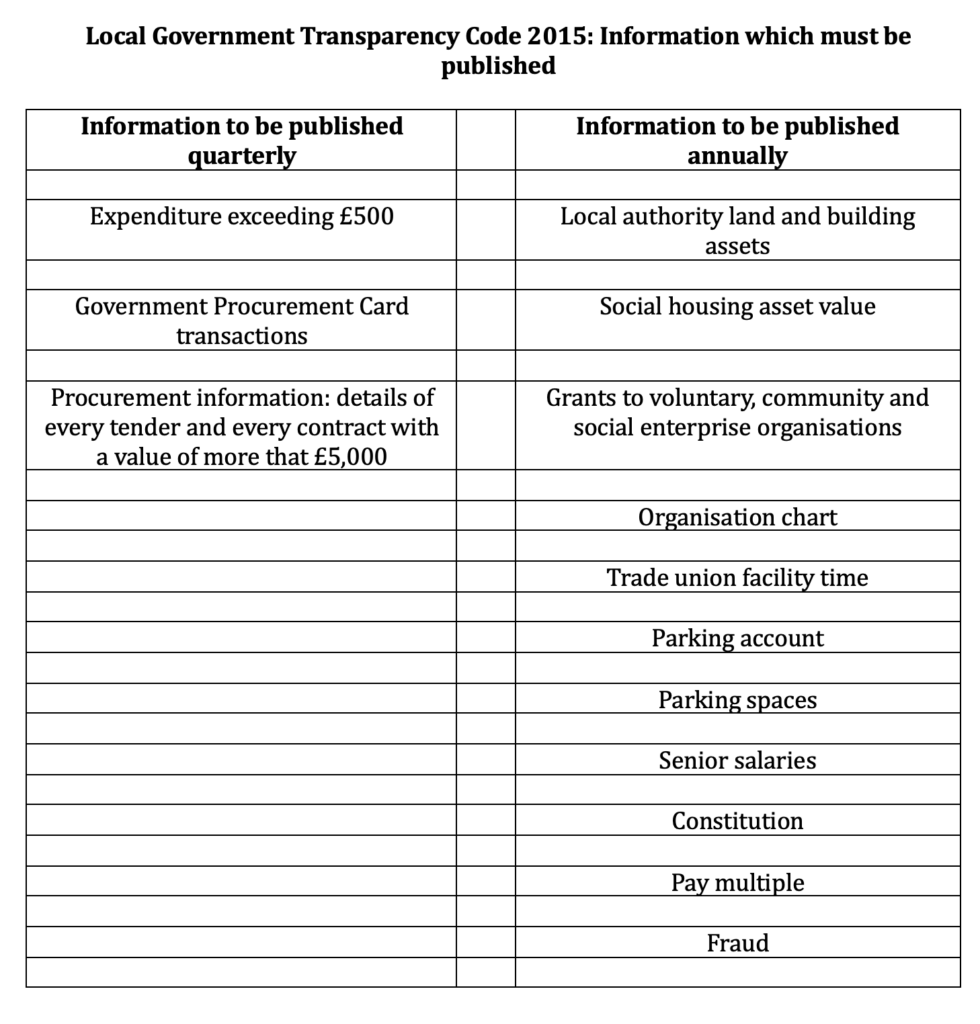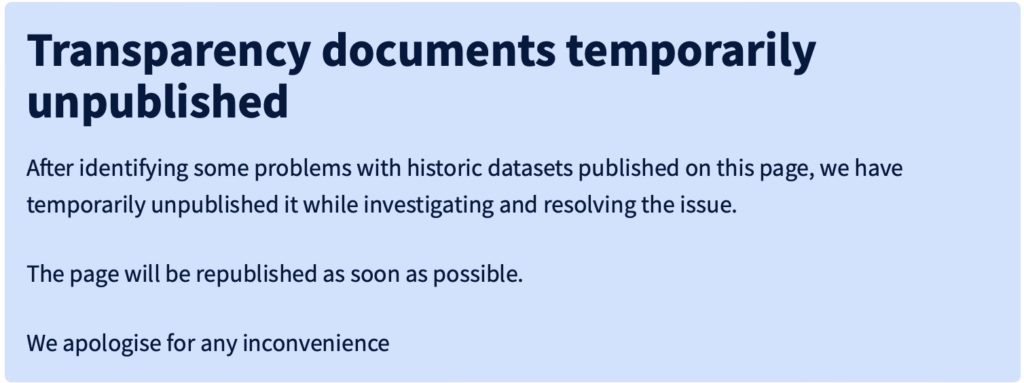New investigation reveals that since 2015 LBWF has failed to comply with the official transparency rules, so limiting outside scrutiny and accountability
In 2015, the Conservative government introduced an updated version of the Local Government Transparency Code (hereafter LGTC) which set out the information councils must place in the public domain, and how often, with the aim of increasing ‘democratic accountability’.
Subsequently, the LGTC has remained unchanged down to the present.
But it now can be revealed that, although the LGTC is mandatory rather than discretionary, LBWF has blatantly failed to fully comply.
The LGTC covers 14 categories of information, three to be published quarterly, the other ten annually, thus:
It also explains the details to be included in each category, so that, for instance, the listing of a tender must specify ‘reference number; title; description of goods and/or services sought; start, end and review dates; and local authority department responsible’.
Turning to LBWF’s uptake of the LGTC, the content of the ‘Council transparency’ pages on the LBWF website tells all.
First, there is some good news, because it is immediately apparent that LBWF has published several of the LGTC’s 14 information categories consistently over the years, and without any problem. Indeed, the entries on ‘Senior salaries’ underpinned this blog’s January 2024 exposé about the sudden proliferation of high earners in the Town Hall (see links).
However, it is also clear that, as regards other categories, LBWF has been slapdash or worse, as the following demonstrates.
Expenditure exceeding £500
Until c. 2022-23, LBWF published tables of its monthly expenditure without fail, indeed exceeding the LGTC guidance by listing transactions over £250 rather than £500, and posting updates almost immediately after each month ended.
But more recently, and particularly since Director of Finance John Turnbull left the council, the updates have become increasingly erratic, repeatedly breaching the LGTC rule that they should occur ‘not later than 1 month’ after the end of each quarter.
Procurement information
Up to the present, LBWF has published information about tenders and contracts over £5,000 incrementally, and only on specialist websites aimed at contractors, with a link directing members of the public to the same material.
Regrettably, though, the link hasn’t worked for at least the last two years, probably longer, while in addition, the specialist websites are not fully comprehensive, amongst other things because, contrary to the LGTC requirement, they exclude contracts ‘for staff who are employed via consultancy firms or similar agencies’.
More fundamentally, though, it’s doubtful whether this approach is anyway compatible with the LGTC’s core purpose: to make information accessible to all.
And that is why the LGCT insists upon, not piecemeal postings aimed at corporates, but quarterly returns listing all tenders and contracts, presented in a format that is straightforward and easy to use.
Significantly, the Local Government Association is very supportive here, and in its guide to ‘publishing spending and procurement information’ advocates the use of dedicated registers, and continues:
‘We recommend a common approach and format for publishing the content of the contract register to help with the sharing and analysis of data. We advise that the content of the published contract register data matches the format set out in the template provided in Annex I: templates contract register…The template is designed to record tenders, contracts and grants’.
It’s worth noting that while LBWF has ignored this advice, many other councils have followed it.
Local authority land and building assets
Despite acknowledging that ‘Local authorities are required to list details of the property it owns [sic]’ and ‘the details on the property list changes regularly’, the only asset register that LBWF has ever published dates to 2018-19.
Grants to voluntary, community and social enterprise organisations
As far as can be ascertained, LBWF has never published such information.
To sum up, the evidence suggests that LBWF’s overall observance of the LGTC has been at best patchy.
Why the gaps and omissions have happened is not difficult to fathom. Much has been left to departmental heads, and some have been alert to their responsibilities, others not. This in turn reflects the fact that LBWF for many years has placed little emphasis on the importance of transparency, with the provision of information to the public too often viewed as an irritation, or even as something of a battleground, where the main objective is to restrict access.
It’s unarguable, though, that not adopting the LGTC in full disadvantages residents. To illustrate with a current example, as a response to financial pressures, LBWF is now considering whether to prune its property portfolio. Yet it is difficult to see how residents can effectively evaluate the possible options when the only asset register available to them is years out of date.
That is the bones of the story, but there is also an amusing coda.
In January 2024, I alerted Director of Governance and Law, and Monitoring Officer, Mark Hynes, to the fact that LBWF was not complying with the LGTC, and I have updated him twice since.
His response, in my view, has been rather half-hearted, perhaps because he appears to be a little uncertain about the LGCT’s contents.
But recently, the ‘Council transparency’ pages suddenly have been modified to include this advisory:
LBWF appears to have learnt the errors of its ways.
Nevertheless, in true style, there is no admission of error, or honest explanation as to why a re-set is necessary.
The words brass and neck come to mind.


